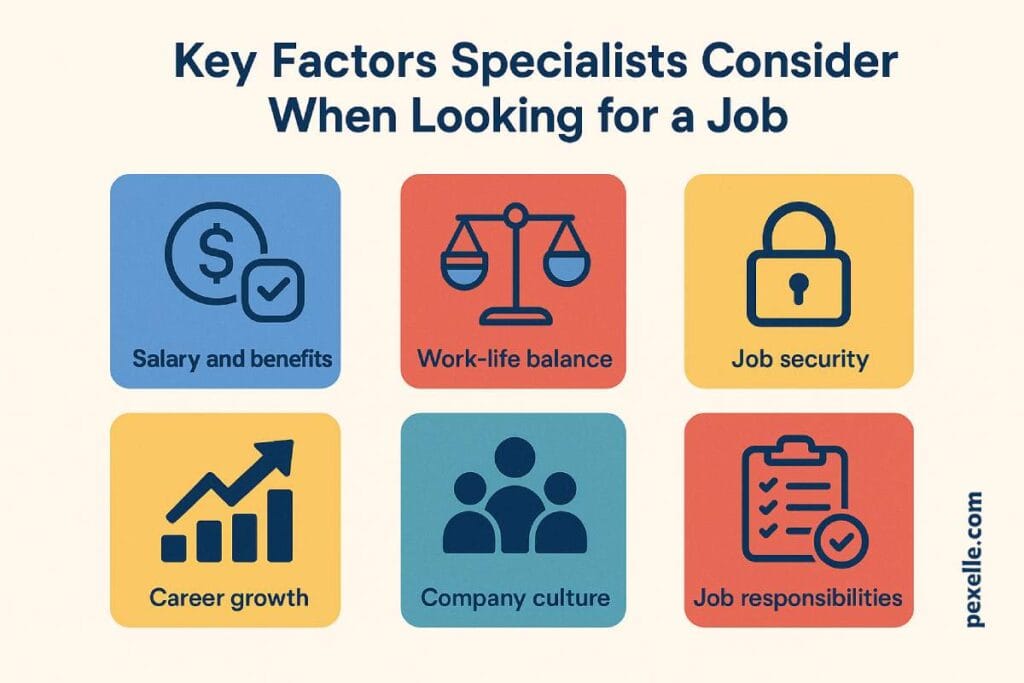Key Factors Specialists Consider When Looking for a Job

In today’s competitive and dynamic job market, professionals—especially specialists with in-demand skills—are no longer looking for just “a job.” They seek roles that align with their long-term goals, personal values, and professional growth. The process of job selection is nuanced and often strategic, taking into account a wide range of parameters beyond salary. Below, we explore the core factors specialists weigh when considering employment opportunities.
1. 📈 Career Growth and Learning Opportunities
For any skilled specialist, continuous growth is essential. Professionals in fields like technology, healthcare, engineering, or finance expect roles that allow them to expand their knowledge and stay up to date with industry advancements. Key considerations include:
- Opportunities for upskilling (courses, certifications, conferences)
- Clear career progression paths (e.g., junior → senior → lead)
- Exposure to challenging projects or cutting-edge technologies
- Mentorship or coaching from industry leaders
A job that lacks learning opportunities often signals stagnation, which many high performers actively avoid.
2. 💰 Compensation, Benefits, and Work-Life Balance
While not the only factor, compensation remains critical. But specialists look beyond base salary. A comprehensive package might include:
- Competitive base salary
- Performance bonuses or stock options
- Health insurance and retirement plans
- Paid time off and parental leave
- Flexible working hours and remote/hybrid options
Work-life balance is a growing concern. Even high-income roles may be rejected if the workload is unsustainable or if the company culture discourages downtime.
3. 🌍 Company Culture and Values
Specialists increasingly assess whether an organization’s culture aligns with their personal and professional values. A few cultural aspects they examine include:
- Leadership transparency and ethical practices
- Diversity, equity, and inclusion (DEI)
- Collaboration, communication style, and team dynamics
- Social or environmental responsibility
- Innovation mindset and openness to new ideas
Workplace environment impacts motivation and mental health—making it a crucial factor in long-term job satisfaction.
4. 📌 Role Clarity and Impact
Before accepting an offer, specialists want to clearly understand the scope of the role and the impact they’ll have. Vague job descriptions or unrealistic expectations are red flags. Instead, professionals seek:
- Clearly defined responsibilities and KPIs
- Alignment between job description and actual work
- Autonomy and authority within their domain
- A sense that their work contributes meaningfully to team or company goals
When specialists see the tangible value of their work, engagement and retention increase significantly.
5. 🌐 Location, Remote Options, and Global Exposure
The rise of remote work has redefined geographical constraints. Today’s specialists consider:
- Remote-first or hybrid work environments
- Relocation support or digital nomad options
- Time zone compatibility and travel expectations
- Global team collaboration and cross-cultural exposure
For many, flexibility in where and how they work is just as important as the work itself.
6. 🏆 Reputation and Market Position of the Employer
Top specialists often prefer to work with reputable, innovative, or mission-driven companies. They analyze:
- Employer branding and Glassdoor reviews
- Market position, growth trajectory, and financial stability
- Awards, media coverage, and industry recognition
- Track record of employee retention and leadership development
Being part of a respected organization can boost a specialist’s resume and future prospects.
Final Thoughts
Choosing the right job is a multi-dimensional decision for any specialist. It’s no longer just about getting hired—it’s about finding purpose, growth, alignment, and balance. Employers who understand and meet these expectations are far more likely to attract and retain top talent in today’s evolving workforce.
Source : Medium.com




